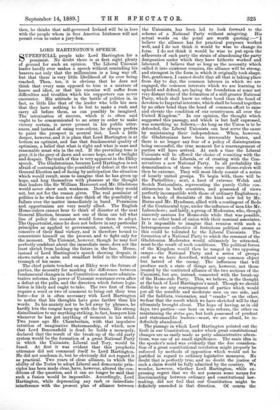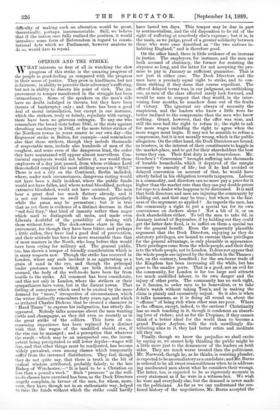LORD HARTINGTON'S SPEECH.
SUPERFICIAL people take Lord Hartington for a pessimist. No doubt there is at first sight plenty of ground for such an opinion. The Liberal Unionist leader hardly ever makes a speech without reminding his hearers not only that the millennium is a long way off, but that there is very little likelihood of its ever being reached. Then, too, it is obvious that he does not think that every man opposed to him is a mixture of knave and idiot, or that his enemies will suffer from difficulties and troubles which his supporters can never encounter. His attitude in the battle of politics is, in fact, as little like that of the leader who tells his men that they have nothing to do but to make a rush and carry all before them, as can possibly be imagined. The intoxication of success, which it is often said ought to be communicated to an army in order to make victory certain, is never present in his public utter- ances, and instead of using rose-colour, he always prefers to paint the prospect in neutral tint. Look a little deeper, however, and it is plain that Lord Hartington is at bottom an optimist, and has that fundamental quality of optimism, a belief that what is right and what is sane and reasonable must win in the end. If the prevailing tone is grey, it is the grey of dawn and secure hope, not of twilight and despair. The truth of this is very apparent in the Ilkley speech. The Gladstonians, because Lord Hartington is not afraid of contemplating the possibility of defeat at the next General Election and of facing by anticipation the situation which would result, seem to imagine that he has given up hope, and hug themselves with pleasure at the thought that leaders like Sir William Harcourt and Mr. Gladstone would never show such weakness. Doubtless they would not, but not for the reason given. The real pessimist of politics is he who does not dare think of the possibility of failure over the matter immediately in hand. Pessimism and opportunism are very nearly allied. The English Home-rulers cannot bear to think of disaster at the next General Election, because not one of them can tell what line of policy the occasion would force them to adopt. The Opportunist, since he does not believe in any particular principles as applied to government, cannot, of course, conceive of their final victory, and is therefore bound to concentrate himself on the present, and to fight only for the moment. The Unionist, however, though he may feel perfectly confident about the immediate issue, does not the least shrink from looking the future in the face. Hence, instead of Lord Hartington's speech showing despair, it shows rather a calm and steadfast belief in the ultimate triumph of his cause. The chief points touched on at Ilkley were the future of parties, the necessity for marking the difference between fundamental changes in the Constitution and mere adminis- trative reforms, the power of Unionist resistance even after a defeat at the polls, and the direction which future legis- lation is likely and ought to take. The two first of these require a word or two of comment to bring out their true force—for it is often necessary with Lord Hartington to notice that his thoughts have gone farther than his words. In his anxiety not to be led away by phrases, he hardly lets the tongue keep up with the brain. His strong disinclination to say anything striking, in fact, hampers him whenever he has got anything of moment in his mind. Two years ago Mr. Chamberlain, with that impulsive intuition of imaginative Statesmanship, of which, now that Lord Beaconsfield. is dead, he holds a monopoly, declared that the result of the break-up of the old party system would be the formation of a great National Party in which the Unionists, Liberal and Tory, would be fused. At first it was evident that this prophetic utterance did not commend itself to Lord Hartington. He did not condemn it, but he obviously did not regard it as practical. Two years of .close affiance, in which the ability of the Tories to adopt Liberal and democratic prin- ciples has been made clear, have, however, altered the con- ditions of the question, and it can no longer be said that such a fusion would be impossible. Accordingly, Lord Hartington, while deprecating any rash or immediate interference with the present plan of alliance between the Unionists, has been led to look forward to the scheme of a National Party without misgiving. His actual words on the point are worth quoting :—" I believe the alliance has for practical purposes worked well, and I do not think it would be wise to change its form. I do not think it would be wise to put upon the adherents of each party the strain of abandoning the party designation under which they have hitherto worked and laboured. I believe that so long as the necessity which called it into existence remains, the alliance will be strong, and strongest in the form in which it originally took shape. But, gentlemen, I cannot doubt that all that is taking place from day to day, the common labours in which we are engaged, the common interests which we are learning to uphold and defend, are laying the foundation at some not very distant time of the formation of a still greater National Party, which shall know no other bond than the bond of devotion to Imperial interests, which shall be bound together by no other bond than the bond of common effort to raise and elevate the condition of our countrymen all over the United Kingdom." In our opinion, the thought which suggested this passage, and which is but half expressed, was something as follows,—As long as the Union is to be defended, the Liberal Unionists can best serve the cause by maintaining their independence. When, however, the Gladstonians have been irrevocably beaten, and there is no longer any fear of a policy of disintegration being successful, the true moment for a rearrangement of parties will have arrived. At such a time the Liberal Unionists will be offered the choice of reuniting with the remainder of the Liberals, or of creating with the Con- servatives a new National Party. In all probability the demoralisation of those who were once Home-rulers will then be extreme. They will most likely consist of a series of loosely united groups. To begin with, there will be the Parnellites ; next, a knot of extreme Welsh and Scotch Nationalists, representing the purely Celtic con- stituencies in both countries, and possessed of views perfectly incompatible with those of ordinary Englishmen ; then a body of Socialists of the kind now led by Mr. Burns and Mr. Hyndman, allied with a contingent of Reds of the Continental type, under the influence of men like Mr. Labouchere ; and lastly, a group of Moderates, who, though sincerely anxious for Home-rule while that was possible, have no other bond of union with their nominal associates. It is impossible to imagine that reunion with such a. heterogeneous collection of fortuitous political atoms as this could be tolerated by the Liberal Unionists. The formation of a National Party to which the remnant of the Gladstonian Moderates would ultimately be attracted, must be the result of such conditions. The political forces of the Kingdom would then be ranged in two opposing camps—the National Party and a series of groups such as we have described, without any common object but hatred of the enemy. The influences that will produce such a state of things are, however, not those created by the continued affiance of the two sections of the Unionists, but are, instead, connected with the break-up of the Home-rule Party. This, we believe, is the thought at the back of Lord Hartington's mind. Though we should dislike to see any rearrangement of parties which would put all the sensible and moderate men on one side, and all the faddists, visionaries, and " cranks " on the other, we fear that the result which we have sketched will be that ultimately brought about. The hope of having, as in old days, two parties—one bent on wise reform, the other on maintaining the status quo, but both possessed of prudent and statesmanlike leaders—must, we are afraid, be in- definitely abandoned. The passage in which Lord Hartington pointed out the fault in our Constitution, under which great constitutional changes are as easily made as petty administrative altera- tions, was one of no small significance. The main idea in the speaker's mind was evidently that the due considera. lion of a great constitutional revolution might properly be enforced by methods of opposition which would not be justified in regard to ordinary legislative measures. No doubt that is perfectly true, and no doubt the justice of such a claim would be fully admitted by the country. We wonder, however, whether Lord Hartington, while ex- pressing regret that we do not possess some means for discriminating between ordinary and constitutional law- making, did not feel that our Constitution might be definitely amended in that direction. Of course the difficulty of making such an alteration would be great, theoretically, perhaps, insurmountable. Still, we believe that if the nation once fully realised the position, it would introduce some form of Referendum in regard to consti- tutional Acts which no Parliament, however anxious to do so, would dare to repeal.



































 Previous page
Previous page